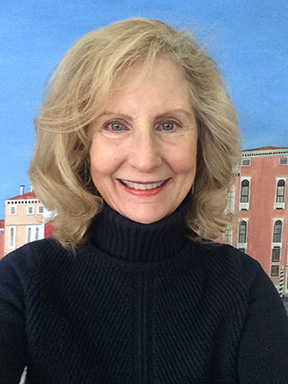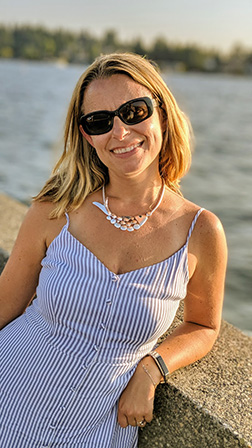Alice Benson lives in Wisconsin with her spouse and their two dogs. She discovered writing as a passion in the third act of her life and spends much of her time in pursuit of metaphors. Alice recently retired from a job in a human services field; previously she spent over thirteen years working with a domestic violence program.
Her shorter published works have appeared in a Main Street Rag Anthology, Epiphany, Molotov Cocktail, Cliterature, English Kills Review, Scrutiny Literary Journal, Shooter Literary Magazine, Diverse Voices Quarterly and a variety of other publications. Both Alice’s books and many of her shorter works address intimate partner violence, abuse, and sexual assault. Alice’s first book, Her Life is Showing, set in a domestic violence shelter was published by Black Rose Writing in 2014. Alice’s second novel, A Year In Her Life, tackles many difficult social issues and was published by Black Rose Writing in July 2019. For more information, visit Alice’s website.
If you haven't read Alice's story, "Silence," yet, click through here and then return for an interview with the author.
-----interview with Sue Bradford Edwards-----
WOW: What was your inspiration for “Silence”?
Alice: I was visiting Arizona when I drafted the story, and we had a red brick wall around our patio. I sat on the patio to write, and the story began with that wall. As I imagined coloring the lines with a sharpie, the story grew and then my thoughts moved to children. Over the years, friends and family who struggled with infertility issues had shared some of their pain with me. As this story developed, I wanted to pay tribute to their challenges.
WOW: So often here at the Muffin, we read stories told from a woman’s point of view. Why did you decide to tell the story from the husband’s perspective instead of the wife’s?
Alice: I began the first draft of “Silence” as an exercise in a writing workshop. Our assignment was to create a main character that “reacted to the trauma/problems/issues of a secondary character and reveal the main character through thoughts and description.” I almost always write from a woman’s perspective, and I saw this as an opportunity to get into the head of someone different. I related to the wife’s anguish, and I wanted to explore and understand the husband’s pain more thoroughly.
WOW: How did this story change and grow from your initial idea to the story that you submitted?
Alice: As I mentioned, the story began as an exercise in a workshop, so it took me several drafts to advance it into a fully formed piece with a beginning, middle, and ending. I was focused on the description in the first two drafts and, as I kept writing, I changed focus to character development.
As I began thinking more about the characters, they came alive in my head. Generally, characters become more and more real as I write them. I knew that the wife was devastated by the infertility issues they faced, and as I reflected more, I saw that the husband’s emotions were different. He was sad, but mostly sad for her, and he was conflicted because he also felt some relief. I didn’t plan that, and I was a bit surprised. As I delved further into their characters, though, his feelings made sense to me. I’m always fascinated by how stories develop and characters manage to speak their truth.
My characters sometimes decide the path they want to take, and they will tell me when I'm trying to push them to do something that they don't believe is the best way for them to go. For example, a few years ago, I read a newspaper article about a stripper who got bit on the breast by a monkey; I thought that called out for a short story. I started it as a light, humorous piece, but as I got to know the stripper, it changed into a darker, more intense story about sexual abuse and lost dreams.
WOW: Readers who are interested in the stripper's story can click through to read "What She Had." Alice, I saw on your website that you have been reading Waking Up White and Finding Myself in the Story of Race. How have the themes in this book impacted your writing?
Alice: I’m reading Waking Up White and Finding Myself in the Story of Race in an on-going effort to educate myself about racism in our country and my role in it. I find I still have much to learn about many, many things, which is both overwhelming and exciting.
I’ve spent much of my adult life involved with various social justice issues. I worked in a domestic violence shelter; I served on the board of our local LGBT Center and a local anti-poverty organization. I volunteered teaching English as a Second Language, and I worked as an advocate for adults with disabilities. Many of those opportunities have had a huge impact on my writing.
My first novel was set in a domestic violence shelter where I was able to explore the influence of intimate partner violence in the lives of the characters, as well as in the larger community. The main character in my second book was very involved in social causes, and she allowed me to examine and discuss issues related to violence, racism, and sexism in the novel.
WOW: You write such a wide variety of things from novels to essays. What are you working on now? Do you have anything new coming out?
Alice: Right now I’m working on my third novel which focuses on the bonds between mothers and daughters and grandmothers and granddaughters. I don’t have a daughter, but I do have two granddaughters. Exploration of these relationships is new territory for me and so much fun. I’m hoping to have the book completed by early 2021. As ideas continue to swirl through my head, I’ll also continue to write blog posts and the occasional short story.
WOW: Good luck wrapping up your current novel and we hope our readers will soon be visiting your web site. Thank you for sharing your process with us!
Read More »
Her shorter published works have appeared in a Main Street Rag Anthology, Epiphany, Molotov Cocktail, Cliterature, English Kills Review, Scrutiny Literary Journal, Shooter Literary Magazine, Diverse Voices Quarterly and a variety of other publications. Both Alice’s books and many of her shorter works address intimate partner violence, abuse, and sexual assault. Alice’s first book, Her Life is Showing, set in a domestic violence shelter was published by Black Rose Writing in 2014. Alice’s second novel, A Year In Her Life, tackles many difficult social issues and was published by Black Rose Writing in July 2019. For more information, visit Alice’s website.
If you haven't read Alice's story, "Silence," yet, click through here and then return for an interview with the author.
-----interview with Sue Bradford Edwards-----
WOW: What was your inspiration for “Silence”?
Alice: I was visiting Arizona when I drafted the story, and we had a red brick wall around our patio. I sat on the patio to write, and the story began with that wall. As I imagined coloring the lines with a sharpie, the story grew and then my thoughts moved to children. Over the years, friends and family who struggled with infertility issues had shared some of their pain with me. As this story developed, I wanted to pay tribute to their challenges.
WOW: So often here at the Muffin, we read stories told from a woman’s point of view. Why did you decide to tell the story from the husband’s perspective instead of the wife’s?
Alice: I began the first draft of “Silence” as an exercise in a writing workshop. Our assignment was to create a main character that “reacted to the trauma/problems/issues of a secondary character and reveal the main character through thoughts and description.” I almost always write from a woman’s perspective, and I saw this as an opportunity to get into the head of someone different. I related to the wife’s anguish, and I wanted to explore and understand the husband’s pain more thoroughly.
WOW: How did this story change and grow from your initial idea to the story that you submitted?
Alice: As I mentioned, the story began as an exercise in a workshop, so it took me several drafts to advance it into a fully formed piece with a beginning, middle, and ending. I was focused on the description in the first two drafts and, as I kept writing, I changed focus to character development.
As I began thinking more about the characters, they came alive in my head. Generally, characters become more and more real as I write them. I knew that the wife was devastated by the infertility issues they faced, and as I reflected more, I saw that the husband’s emotions were different. He was sad, but mostly sad for her, and he was conflicted because he also felt some relief. I didn’t plan that, and I was a bit surprised. As I delved further into their characters, though, his feelings made sense to me. I’m always fascinated by how stories develop and characters manage to speak their truth.
My characters sometimes decide the path they want to take, and they will tell me when I'm trying to push them to do something that they don't believe is the best way for them to go. For example, a few years ago, I read a newspaper article about a stripper who got bit on the breast by a monkey; I thought that called out for a short story. I started it as a light, humorous piece, but as I got to know the stripper, it changed into a darker, more intense story about sexual abuse and lost dreams.
WOW: Readers who are interested in the stripper's story can click through to read "What She Had." Alice, I saw on your website that you have been reading Waking Up White and Finding Myself in the Story of Race. How have the themes in this book impacted your writing?
Alice: I’m reading Waking Up White and Finding Myself in the Story of Race in an on-going effort to educate myself about racism in our country and my role in it. I find I still have much to learn about many, many things, which is both overwhelming and exciting.
I’ve spent much of my adult life involved with various social justice issues. I worked in a domestic violence shelter; I served on the board of our local LGBT Center and a local anti-poverty organization. I volunteered teaching English as a Second Language, and I worked as an advocate for adults with disabilities. Many of those opportunities have had a huge impact on my writing.
My first novel was set in a domestic violence shelter where I was able to explore the influence of intimate partner violence in the lives of the characters, as well as in the larger community. The main character in my second book was very involved in social causes, and she allowed me to examine and discuss issues related to violence, racism, and sexism in the novel.
WOW: You write such a wide variety of things from novels to essays. What are you working on now? Do you have anything new coming out?
Alice: Right now I’m working on my third novel which focuses on the bonds between mothers and daughters and grandmothers and granddaughters. I don’t have a daughter, but I do have two granddaughters. Exploration of these relationships is new territory for me and so much fun. I’m hoping to have the book completed by early 2021. As ideas continue to swirl through my head, I’ll also continue to write blog posts and the occasional short story.
WOW: Good luck wrapping up your current novel and we hope our readers will soon be visiting your web site. Thank you for sharing your process with us!






















